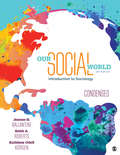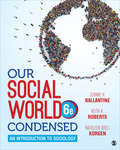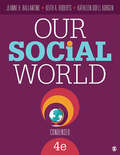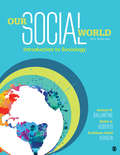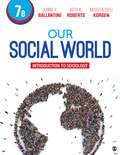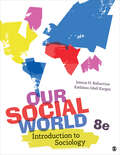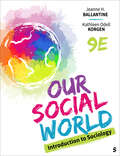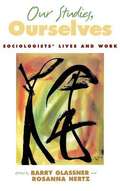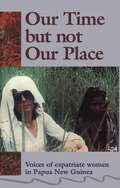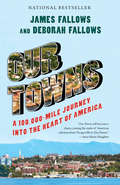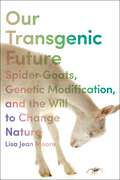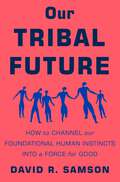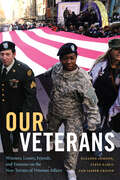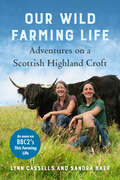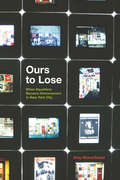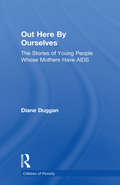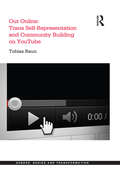- Table View
- List View
Our Social World: An Introduction to Sociology
by Jeanne H. Ballantine Keith A. Roberts Kathleen Odell KorgenOur Social World: Introduction to Sociology, Condensed, inspires students to develop their sociological imaginations, to see the world and personal events from a new perspective, and to confront sociological issues on a day-to-day basis. The award-winning author team of Jeanne H. Ballantine, Keith A. Roberts, and Kathleen Odell Korgen organizes the text around the "Social World Model,” a conceptual framework that demonstrates the relationships among individuals (the micro level); organizations, institutions, and subcultures (the meso level); and societies and global structures (the macro level). The application of this model across chapters helps students practice using the three levels of analysis and view sociology as an integrated whole rather than a set of discrete subjects. The Fifth Edition of the Condensed version is adapted from Our Social World: Introduction to Sociology and is one-third shorter by streamlining boxes and the main narrative, and combining four chapters into two (Family/Education, and Politics/Economics). New and Key Features A new full-length chapter on health, illness, and healthcare has been added. Several chapters have been reorganized with updated data, added studies, and newly emerging emphases in sociology. Six new “Sociologists in Action” features added. Four new “Engaging Sociology” features added with new opportunities for data analysis by students. 100 new or updated Tables and Figures, nearly 500 new references, and dozens of older references removed. Many sentences and definitions in the book have been revised for brevity and clarity, and the glossary has been updated for better correspondence with the text. Links to exceptional teaching resources from A.S.A.’s TRAILS (Teaching Resources and Innovation Library for Sociology) available in SAGE coursepacks. MCAT Guide maps chapter content to Foundational Concepts and Content Categories in Section 3 of the MCAT test available in SAGE coursepacks.
Our Social World: An Introduction to Sociology
by Jeanne H. Ballantine Keith A. Roberts Kathleen Odell KorgenOur Social World: Condensed, by Jeanne H. Ballantine, Keith A. Roberts, and Kathleen Odell Korgen, inspires you to develop your sociological imaginations, to see the world and personal events from a new perspective, and to confront sociological issues on a day-to-day basis. The award-winning author team organizes the text around the "Social World" model, a conceptual framework that demonstrates the relationships among individuals (the micro level); organizations, institutions, and subcultures (the meso level); and societies and global structures (the macro level). The use of the Social World Model across chapters (represented in a visual diagram in the chapter openers) helps you to develop the practice of using three levels of analysis, and to view sociology as an integrated whole, rather than a set of discrete subjects. The Condensed version is adapted from Our Social World: Introduction to Sociology. The Sixth Edition of the Condensed version is made approximately 30% shorter than the full edition by removing selected boxes, editing the main narrative, and combining four chapters into two (Family/Education, and Politics/Economics).
Our Social World: An Introduction to Sociology
by Jeanne H. Ballantine Keith A. Roberts Kathleen Odell KorgenOur Social World: Condensed, by Jeanne H. Ballantine, Keith A. Roberts, and Kathleen Odell Korgen, inspires you to develop your sociological imaginations, to see the world and personal events from a new perspective, and to confront sociological issues on a day-to-day basis. The award-winning author team organizes the text around the "Social World" model, a conceptual framework that demonstrates the relationships among individuals (the micro level); organizations, institutions, and subcultures (the meso level); and societies and global structures (the macro level). The use of the Social World Model across chapters (represented in a visual diagram in the chapter openers) helps you to develop the practice of using three levels of analysis, and to view sociology as an integrated whole, rather than a set of discrete subjects. The Condensed version is adapted from Our Social World: Introduction to Sociology. The Sixth Edition of the Condensed version is made approximately 30% shorter than the full edition by removing selected boxes, editing the main narrative, and combining four chapters into two (Family/Education, and Politics/Economics).
Our Social World: Condensed
by Jeanne H. Ballantine Keith A. Roberts Kathleen O. KorgenIn the new Fourth Edition of Our Social World: Condensed, three award-winning authors and teachers of sociology set out to inspire students to see how larger structures and global trends affect their personal lives, to develop their sociological imaginations, and to view both world events and their personal experiences from a sociological perspective. In each chapter of this innovative and engaging text, authors Jeanne H. Ballantine, Keith A. Roberts, and new co-author Kathleen Odell Korgen, reveal the relationships between various levels of the social system and provide students with hands-on opportunities to engage with the material covered and to hear from "sociologists in action."
Our Social World: Introduction to Sociology
by Jeanne H. Ballantine Keith A. Roberts Kathleen Odell KorgenInspire your students to develop their sociological imaginations in Our Social World. Focused on deep learning rather than memorization, this book encourages readers to analyze, evaluate, and apply information about the social world; to see the connection between the world and personal events from a new perspective; and to confront sociological issues on a day-to-day basis. Organized around the "Social World Model”, a conceptual framework used across chapters to see the complex links between various micro- to macro-levels of the social system, students will develop the practice of using three levels of analysis, and to view sociology as an integrated whole, rather than a set of discrete subjects.
Our Social World: Introduction to Sociology
by Jeanne H. Ballantine Keith A. Roberts Kathleen Odell KorgenInspire your students to develop their sociological imaginations in Our Social World. Focused on deep learning rather than memorization, this book encourages readers to analyze, evaluate, and apply information about the social world; to see the connection between the world and personal events from a new perspective; and to confront sociological issues on a day-to-day basis. Organized around the "Social World Model”, a conceptual framework used across chapters to see the complex links between various micro- to macro-levels of the social system, students will develop the practice of using three levels of analysis, and to view sociology as an integrated whole, rather than a set of discrete subjects.
Our Social World: Introduction to Sociology
by Jeanne H. Ballantine Keith A. Roberts Kathleen Odell KorgenOur Social World: Introduction to Sociology inspires students to develop their sociological imaginations, to see the world and personal events from a new perspective, and to confront sociological issues on a day-to-day basis. Organized around the "Social World" model, a conceptual framework that demonstrates the relationships among individuals (the micro level); organizations, institutions, and subcultures (the meso level); and societies and global structures (the macro level), Jeanne H. Ballantine, Keith A. Roberts, and Kathleen Odell Korgen use this framework to help students develop the practice of using three levels of analysis, and to view sociology as an integrated whole, rather than a set of discrete subjects. The Seventh Edition includes new coverage of climate change, the influence of robots and artificial intelligence on workers, race relations in the Trump era, issues related to transgender identity and gender fluidity, sexual harassment in the workplace and the #MeToo movement, declining marriage rates, the impact of tracking for students at all academic achievement levels, smoking as an example of health and inequality in the US, gun violence and the student movement to control access to guns, social media, and Russian interference in the 2016 election.
Our Social World: Introduction to Sociology
by Jeanne H. Ballantine Keith A. Roberts Kathleen Odell KorgenOur Social World: Introduction to Sociology inspires students to develop their sociological imaginations, to see the world and personal events from a new perspective, and to confront sociological issues on a day-to-day basis. Organized around the "Social World" model, a conceptual framework that demonstrates the relationships among individuals (the micro level); organizations, institutions, and subcultures (the meso level); and societies and global structures (the macro level), Jeanne H. Ballantine, Keith A. Roberts, and Kathleen Odell Korgen use this framework to help students develop the practice of using three levels of analysis, and to view sociology as an integrated whole, rather than a set of discrete subjects. The Seventh Edition includes new coverage of climate change, the influence of robots and artificial intelligence on workers, race relations in the Trump era, issues related to transgender identity and gender fluidity, sexual harassment in the workplace and the #MeToo movement, declining marriage rates, the impact of tracking for students at all academic achievement levels, smoking as an example of health and inequality in the US, gun violence and the student movement to control access to guns, social media, and Russian interference in the 2016 election.
Our Social World: Introduction to Sociology
by Jeanne H. Ballantine Kathleen Odell KorgenThe Eighth Edition of Our Social World: Introduction to Sociology inspires students to develop their sociological imaginations, to see the world and personal events from a new perspective, and to confront sociological issues on a day-to-day basis. The text is organized around the "Social World" model, a conceptual framework that demonstrates the relationships among individuals (the micro level); organizations, institutions, and subcultures (the meso level); and societies and global structures (the macro level). The consistent application of the Social World Model across chapters (represented in a visual diagram in the chapter openers) helps students develop the practice of using three levels of analysis, and to view sociology as an integrated whole, rather than a set of disparate subjects. This title is accompanied by a complete teaching and learning package in SAGE Vantage, an intuitive learning platform that integrates quality SAGE textbook content with assignable multimedia activities and auto-graded assessments to drive student engagement and ensure accountability. Unparalleled in its ease of use and built for dynamic teaching and learning, Vantage offers customizable LMS integration and best-in-class support.
Our Social World: Introduction to Sociology
by Jeanne H. Ballantine Kathleen Odell KorgenThe Eighth Edition of Our Social World: Introduction to Sociology inspires students to develop their sociological imaginations, to see the world and personal events from a new perspective, and to confront sociological issues on a day-to-day basis. The text is organized around the "Social World" model, a conceptual framework that demonstrates the relationships among individuals (the micro level); organizations, institutions, and subcultures (the meso level); and societies and global structures (the macro level). The consistent application of the Social World Model across chapters (represented in a visual diagram in the chapter openers) helps students develop the practice of using three levels of analysis, and to view sociology as an integrated whole, rather than a set of disparate subjects. This title is accompanied by a complete teaching and learning package in SAGE Vantage, an intuitive learning platform that integrates quality SAGE textbook content with assignable multimedia activities and auto-graded assessments to drive student engagement and ensure accountability. Unparalleled in its ease of use and built for dynamic teaching and learning, Vantage offers customizable LMS integration and best-in-class support.
Our Social World: Introduction to Sociology
by Jeanne H. Ballantine Kathleen Odell KorgenThe Ninth Edition of Our Social World: Introduction to Sociology by Jeanne H. Ballantine and Kathleen Odell Korgen inspires students to develop their sociological imaginations, see the world and personal events from a new perspective, and confront sociological issues on a day-to-day basis. The text is organized around the "Social World" model, a conceptual framework that demonstrates the relationships among individuals (the micro level); organizations, institutions, and subcultures (the meso level); and societies and global structures (the macro level). The consistent application of the Social World Model across chapters (represented in a visual diagram in the chapter openers) helps students develop the practice of using three levels of analysis, and to view sociology as an integrated whole, rather than a set of disparate subjects.
Our Social World: Introduction to Sociology
by Jeanne H. Ballantine Kathleen Odell KorgenThe Ninth Edition of Our Social World: Introduction to Sociology by Jeanne H. Ballantine and Kathleen Odell Korgen inspires students to develop their sociological imaginations, see the world and personal events from a new perspective, and confront sociological issues on a day-to-day basis. The text is organized around the "Social World" model, a conceptual framework that demonstrates the relationships among individuals (the micro level); organizations, institutions, and subcultures (the meso level); and societies and global structures (the macro level). The consistent application of the Social World Model across chapters (represented in a visual diagram in the chapter openers) helps students develop the practice of using three levels of analysis, and to view sociology as an integrated whole, rather than a set of disparate subjects.
Our Studies, Ourselves: Sociologists' Lives and Work
by Rosanna Hertz Barry GlassnerWhat motivates a lifelong scholarly pursuit, and how do one's studies inform life outside the academy? Sociologists, who live in families but also study families, who go to work but also study work, who participate in communities but also try to understand communities, have an especially intimate relation to their research. Growing up poor, struggling as a woman in a male-dominated profession, participating in protests against the Vietnam War; facts of life influence research agendas, individual understandings of the world, and ultimately the shape of the discipline as a whole. Barry Glassner and Rosanna Hertz asked twenty-two of America's most prominent sociologists to reflect upon how their personal lives influenced their research, and vice versa, how their research has influenced their lives. In this volume, the authors reveal with candor and discernment how world events, political commitments and unanticipated constraints influenced the course of their careers. They disclose how race, class, and gender proved to be pivotal elements in the course of their individual lives, and in how they carry out their research.; Faced with academic institutions that did not hire or promote persons of their gender, race, sexual orientation, or physical disability, they invented new routes to success within their fields. Faced with disappointments in political organizations to which they were devoted, they found ways to integrate their disillusionment into their research agendas. While some of the contributors radically changed their political commitments, and others saw more stability, none stood still. An intimate look at biography and craft, these snapshots provide a fascinating glimpse of the sociological life for colleagues, other academics, and aspiring young sociologists. The collection demonstrates how inequalities and injustices can be made into motors for scholarly research, which in turn have the power to change individual life courses and entire societies
Our Time But Not Our Place: Voices of expatriate women in Papua New Guinea
by Myra Jean Bourke Susanne Holz Kathy Kituai Linda RoachOver the years thousands of women, mostly Australians, have lived as expatriates in Papua New Guinea. We went there at different points in our lives and for a variety of reasons. Some of us were keen to go; we were looking for adventure in exotic surroundings, seeking our fortunes, changing jobs, running away from unhappy situations, furthering our professional or academic interests. Many of us were motivated to go to a developing country to 'do good'. Others went because their partners or their parents had an ambition, an obsession or a contract. All have stories to tell.So begins Our Time But Not Our Place in which 31 women tell us of their experiences of Papua New Guinea. Their voices are as diverse as the encounters they describe; their stories span the time between 1930 and 1990; together their responses challenge commonly held views of the expatriate condition.
Our Towns: A 100,000-Mile Journey into the Heart of America
by James Fallows Deborah FallowsA vivid, surprising portrait of the civic and economic reinvention taking place in America, town by town and generally out of view of the national media. A realistically positive and provocative view of the country between its coasts. For the last five years, James and Deborah Fallows have been traveling across America in a single-engine prop airplane. Visiting dozens of towns, they have met hundreds of civic leaders, workers, immigrants, educators, environmentalists, artists, public servants, librarians, business people, city planners, students, and entrepreneurs to take the pulse and understand the prospects of places that usually draw notice only after a disaster or during a political campaign. The America they saw is acutely conscious of its problems—from economic dislocation to the opioid scourge—but itis also crafting solutions, with a practical-minded determination at dramatic odds with the bitter paralysis of national politics. At times of dysfunction on a national level, reform possibilities have often arisen from the local level. The Fallowses describe America in the middle of one of these creative waves. Their view of the country is as complex and contradictory as America itself, but it also reflects the energy, the generosity and compassion, the dreams, and the determination of many who are in the midst of making things better. Our Towns is the story of their journey—and an account of a country busy remaking itself.
Our Transgenic Future: Spider Goats, Genetic Modification, and the Will to Change Nature
by Lisa Jean MooreHow scientific advances in genetic modification will fundamentally change the natural worldThe process of manipulating the genetic material of one animal to include the DNA of another creates a new transgenic organism. Several animals, notably goats, mice, sheep, and cattle are now genetically modified in this way. In Our Transgenic Future, Lisa Jean Moore wonders what such scientific advances portend. Will the natural world become so modified that it ceases to exist? After turning species into hybrids, can we ever get back to the original, or are they forever lost? Does genetic manipulation make better lives possible, and if so, for whom?Moore centers the story on goats that have been engineered by the US military and civilian scientists using the DNA of spiders. The goat’s milk contains a spider-silk protein fiber; it can be spun into ultra-strong fabric that can be used to manufacture lightweight military body armor. Researchers also hope the transgenically produced spider silk will revolutionize medicine with biocompatible medical inserts such as prosthetics and bandages. Based on in-depth research with spiders in Florida and transgenic goats in Utah, Our Transgenic Future focuses on how these spidergoats came into existence, the researchers who maintain them, the funders who have made their lives possible, and how they fit into the larger science of transgenics and synthetics. This book is a fascinating story about the possibilities of science and the likely futures that may come.
Our Tribal Future: How to Channel Our Foundational Human Instincts into a Force for Good
by David R. SamsonAn astounding and inspiring look at the science behind tribalism, and how we can learn to harness it to improve the world around us.What do you think of when you hear the word “tribalism?” For many, it conjures images of bigotry, xenophobia, and sectarian violence. Others may envision their own tribe: family, friends, and the bonds of loyalty that keep them together. Tribalism is one of the most complex and ancient evolutionary forces; it gave us the capacity for cooperation and competition, and allowed us to navigate increasingly complex social landscapes. It is so powerful that it can predict our behavior even better than race, class, gender, or religion. But in our vast modern world, has this blessing become a curse?Our Tribal Future explores a central paradox of our species: how altruism, community, kindness, and genocide are all driven by the same core adaptation. Evolutionary anthropologist David R. Samson engages with cutting-edge science and philosophy, as well as his own field research with small-scale societies and wild chimpanzees, to explain the science, ethics, and history of tribalism in compelling and accessible terms.This bold and brilliant book reveals provocative truths about our nature. Readers will discover that tribalism cannot, and should not, be eliminated entirely—to do so would be to destroy what makes us human. But is it possible to channel the best of this instinct to enrich our lives while containing the worst of its dangers?
Our Veterans: Winners, Losers, Friends, and Enemies on the New Terrain of Veterans Affairs
by Suzanne Gordon Steve Early Jasper CravenIn Our Veterans, Suzanne Gordon, Steve Early, and Jasper Craven explore the physical, emotional, social, economic, and psychological impact of military service and the problems that veterans face when they return to civilian life. The authors critically examine the role of advocacy organizations, philanthropies, corporations, and politicians who purport to be “pro-veteran.” They describe the ongoing debate about the cost, quality, and effectiveness of healthcare provided or outsourced by the Department of Veterans Affairs (VA). They also examine generational divisions and political tensions among veterans, as revealed in the tumultuous events of 2020, from Black Lives Matter protests to the Trump-Biden presidential contest. Frank and revealing, Our Veterans proposes a new agenda for veterans affairs linking service provision to veterans to the quest for broader social programs benefiting all Americans.
Our War on Ourselves
by Willem H. VanderburgOur approach to knowing and doing is based on delegating physical phenomena to physicists, biological phenomena to biologists, social phenomena to sociologists, economic phenomena to economists, and so on. This approach to knowledge and practice works very well when one category of phenomena dominates (as in mechanical and technical systems), but does not work when many categories of phenomena make significant contributions (as in the biological and cultural spheres). As a result, our civilization succeeds in its scientific and technical endeavours yet fails in dealing with communities and ecosystems.Following his groundbreaking Labyrinth of Technology and Living in the Labyrinth of Technology, Willem H. Vanderburg's Our War on Ourselves explores the type of war we have unleashed on our lives by emphasizing discipline-based processes. The work also illuminates how we can achieve a more balanced, livable, and sustainable future by combining technical and cultural perspectives in our educational and institutional settings.
Our Wild Farming Life: Adventures on a Scottish Highland Croft
by Lynn Cassells Sandra BaerAs seen on the BBC’s This Farming Life The inspirational story of Lynbreck Croft—a regenerative Scottish farm rooted in local food, community, and the dreams of two women. "A ripping good account of the guts, luck and perseverance it takes to create a productive and healthy farm or croft that jumps the rails of our conventional industrial agriculture."—Nick Offerman, New York Times bestselling author of Where the Deer and the Antelope Play "I raced through this beautiful story with mounting awe and excitement. . . . Pragmatism, honesty and openness to new and old ideas shines through on every page. I hope it inspires legions of new farmers."—Isabella Tree, author of Wilding Lynn and Sandra left their friends, family, and jobs in England to travel north to Scotland to find a bit of land that they could call their own. They had in mind keeping a few chickens, a kitchen garden, and renting out some camping space; instead, they fell in love with Lynbreck Croft—150 acres of opportunity and beauty, shrouded by the Cairngorms and deep in the Highlands of Scotland. But they had no money, no plan, and no experience in farming. In Our Wild Farming Life, Lynn and Sandra recount their experiences as they rebuild their new home and work out what kind of farmers they want to be. They learn how to work with Highland cattle, become part of the crofting community and begin to truly understand how they can farm in harmony with nature to produce wonderful food for themselves and the people around them. Through efforts like these, Lynn and Sandra have been able to combine regenerative farming practices with old crofting traditions to keep their own personal values intact. Our Wild Farming Life is what happens when you follow your dreams of living on the land; a story of how two people became farmers—and how they learned to make a living from it, their way. "[This] is a warm yet realistic chronicle of the world of the small-time farmer, sharing a vision of how we humans can feed ourselves sustainably and ethically while living in harmony with the natural world."—Booklist "For anyone who has ever sat in a city office dreaming of . . . living off the land, this book will inspire them to take the plunge."—The Telegraph
Our Wild Farming Life: Adventures on a Scottish Highland Croft
by Lynn Cassells Sandra BaerAs seen on the BBC&’s This Farming LifeThe inspirational story of Lynbreck Croft—a regenerative Scottish farm rooted in local food, community, and the dreams of two women."A ripping good account of the guts, luck and perseverance it takes to create a productive and healthy farm or croft that jumps the rails of our conventional industrial agriculture."—Nick Offerman, New York Times bestselling author of Where the Deer and the Antelope Play"I raced through this beautiful story with mounting awe and excitement. . . . Pragmatism, honesty and openness to new and old ideas shines through on every page. I hope it inspires legions of new farmers."—Isabella Tree, author of WildingLynn and Sandra left their friends, family, and jobs in England to travel north to Scotland to find a bit of land that they could call their own. They had in mind keeping a few chickens, a kitchen garden, and renting out some camping space; instead, they fell in love with Lynbreck Croft—150 acres of opportunity and beauty, shrouded by the Cairngorms and deep in the Highlands of Scotland.But they had no money, no plan, and no experience in farming.In Our Wild Farming Life, Lynn and Sandra recount their experiences as they rebuild their new home and work out what kind of farmers they want to be. They learn how to work with Highland cattle, become part of the crofting community and begin to truly understand how they can farm in harmony with nature to produce wonderful food for themselves and the people around them. Through efforts like these, Lynn and Sandra have been able to combine regenerative farming practices with old crofting traditions to keep their own personal values intact.Our Wild Farming Life is what happens when you follow your dreams of living on the land; a story of how two people became farmers—and how they learned to make a living from it, their way."[This] is a warm yet realistic chronicle of the world of the small-time farmer, sharing a vision of how we humans can feed ourselves sustainably and ethically while living in harmony with the natural world."—Booklist"For anyone who has ever sat in a city office dreaming of . . . living off the land, this book will inspire them to take the plunge."—The Telegraph
OurSpace: Resisting the Corporate Control of Culture
by Christine HaroldWhen reporters asked about the Bush administration&’s timing in making their case for the Iraq war, then Chief of Staff Andrew Card responded that &“from an marketing point of view, you don&’t introduce new products in August.&” While surprising only in its candor, this statement signified the extent to which consumer culture has pervaded every aspect of life. For those troubled by the long reach of the marketplace, resistance can seem futile. However, a new generation of progressive activists has begun to combat the media supremacy of multinational corporations by using the very tools and techniques employed by their adversaries. In OurSpace, Christine Harold examines the deployment and limitations of &“culture jamming&” by activists. These techniques defy repressive corporate culture through parodies, hoaxes, and pranks. Among the examples of sabotage she analyzes are the magazine Adbusters&’ spoofs of familiar ads and the Yes Men&’s impersonations of company spokespersons. While these strategies are appealing, Harold argues that they are severely limited in their ability to challenge capitalism. Indeed, many of these tactics have already been appropriated by corporate marketers to create an aura of authenticity and to sell even more products. For Harold, it is a different type of opposition that offers a genuine alternative to corporate consumerism. Exploring the revolutionary Creative Commons movement, copyleft, and open source technology, she advocates a more inclusive approach to intellectual property that invites innovation and wider participation in the creative process. From switching the digital voice boxes of Barbie dolls and G.I. Joe action figures to inserting the silhouetted image of Abu Ghraib&’s iconic hooded and wired victim into Apple&’s iPod ads, high-profile instances of anticorporate activism over the past decade have challenged, but not toppled, corporate media domination. OurSpace makes the case for a provocative new approach by co-opting the logic of capitalism itself. Christine Harold is assistant professor of speech communication at the University of Georgia.
Ours to Lose: When Squatters Became Homeowners in New York City
by Amy StarecheskiThough New York's Lower East Side today is home to high-end condos and hip restaurants, it was for decades an infamous site of blight, open-air drug dealing, and class conflict--an emblematic example of the tattered state of 1970s and '80s Manhattan. Those decades of strife, however, also gave the Lower East Side something unusual: a radical movement that blended urban homesteading and European-style squatting in a way never before seen in the United States. Ours to Lose tells the oral history of that movement through a close look at a diverse group of Lower East Side squatters who occupied abandoned city-owned buildings in the 1980s, fought to keep them for decades, and eventually began a long, complicated process to turn their illegal occupancy into legal cooperative ownership. Amy Starecheski here not only tells a little-known New York story, she also shows how property shapes our sense of ourselves as social beings and explores the ethics of homeownership and debt in post-recession America.
Out Here By Ourselves: The Stories of Young People Whose Mothers Have AIDS (Children of Poverty)
by Diane DugganFirst published in 2001. Routledge is an imprint of Taylor & Francis, an informa company.
Out Online: Trans Self-Representation and Community Building on YouTube (Gender, Bodies and Transformation)
by Tobias RaunTrans people are increasingly stepping out of the shadow of pathologization and secretiveness to tell their life stories, share information and to connect with like-minded others, using YouTube as a platform. Out Online: Trans Self-Representation and Community Building on YouTube explores the digital revolution of trans video blogging, addressing ’trans’ in its many meanings and configurations to examine the different ways in which the body in transformation and the vlog as a medium intersect. Drawing on rich, virtual ethnographic studies of trans video blogging, the author sheds light on the ways in which the video blog (or ’vlog’) as a multimodal medium enables trans people to tell their stories with the use of sound, text, music, and pictures - thus offering new ways to construct and archive bodily changes, and to revise the story endlessly. A groundbreaking study of the intersection between trans identity and technology, Out Online explores the transformative and therapeutic potential of the video blog as a means by which trans vloggers can emerge and develop online, using the vlog as a site for creation, intervention, community building and resistance. As such, it will appeal to social scientists and scholars of cultural and media studies with interests in gender, sexuality and embodiment.
